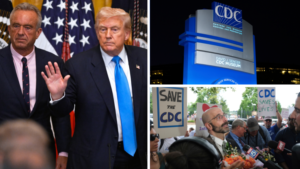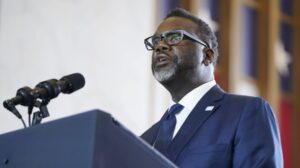Congress
Trump-Schumer standoff heads for fall rematch
Donald Trump and Chuck Schumer went head-to-head last week for the first time in nearly six months. Turns out they were only shadow-boxing — and the real bout is still to come.
The president pulled the plug on a possible deal to confirm some administration nominees, while the Senate’s top Democrat — under pressure from his party to take a tougher stand — boasted afterward that Trump came away with nothing.
Now, the two men are headed toward a fall rematch with much higher stakes: whether to keep the federal government open past a Sept. 30 funding deadline.
Despite decades of history between them, their relationship is now almost nonexistent. They haven’t had a formal one-on-one meeting since Trump’s second inauguration. And they did not speak directly as part of the nominations negotiations, according to two people granted anonymity to discuss private details.
The unraveling of a typical pre-summer-recess nominations deal has many on Capitol Hill concerned about what is to come. While other congressional leaders are sure to figure into the negotiations, it’s Schumer — who will determine whether Senate Democrats filibuster spending legislation — and Trump — who has to sign any shutdown-averting bill — who will be the key players.
“It would be better if those two negotiated,” Sen. Kevin Cramer (R-N.D.) said of Trump and Schumer.
Cramer said Senate Majority Leader John Thune served last week as the “arbitrator” ferrying between the “bare-knuckled” New Yorkers during the recent nominations fight. And Speaker Mike Johnson will have his hands full trying to keep his thin majority united behind a spending strategy that will keep the pressure on Democrats.
Democrats believe the onus is on Thune and Johnson to wrangle Trump — the dominant leader of their party — and convince him to come to the table. They are using their hardball tactics over nominations as a warning shot for the fall funding fight.
“Sooner or later, Donald Trump — Mr. ‘Art of the Deal,’ or so he claims — is going to have to learn that he has to work with Democrats if he wants to get deals, good deals, that help the American people,” Schumer said late Saturday night as the Senate prepared to leave town for the summer. “Going at it alone will be a failed strategy.”
Trump’s decision to temporarily abandon his confirmations push rather than give in to what he called “political extortion” from Schumer allowed the embattled Democratic leader to do a pre-recess victory lap after taking heat from the party base for months.
Schumer came under fierce criticism in March for helping to advance a shutdown-avoiding spending bill written solely by Republicans. He warned at the time that a shutdown would only empower Trump and that the dynamic would be different come September as, he predicted, Trump became more unpopular. Nine other members of his caucus joined him.
Trump initially urged Republicans to stay in Washington until all of the roughly 150 pending nominees were confirmed — a demand that could have essentially erased the Senate’s planned four-week recess.
But Schumer and Democrats demanded that Trump unfreeze congressionally approved spending in return for consenting to the swift approval of some nominees. Trump would not pay the price.
In a post where he blasted “Senator Cryin’ Chuck Schumer,” Trump instructed senators to go home. Republicans flirted with adjourning the Senate to let Trump make recess appointments, but that would have required recalling the House — and reviving the Trump-centered drama over the Jeffrey Epstein files. Instead, they are vowing to pursue a rules change later this year to quickly push Trump’s nominees through the Senate.
Schumer relished the Truth Social post, putting a poster-sized version on display next to him as he spoke to reporters Saturday night and comparing it to a “fit of rage.”
He kept the heat on Monday, joining with House Minority Leader Hakeem Jeffries to demand a so-called “four corners” meeting with Thune and Johnson to discuss a government funding strategy lest a government shutdown hit Oct. 1. (Republicans, who accuse Schumer of “breaking” the funding process, haven’t responded.)
Though Schumer and Thune have had informal talks about September, they haven’t delved beyond the broad strokes. The South Dakota Republican, asked about Trump and Schumer, predicted the two will have an “evolving relationship.”
“At some point, obviously, there are certain things they are just going to have to figure out, because on some of these things where we need 60 [votes] there are going to have to be conversations,” Thune said in a brief interview.
Schumer and Thune joined 85 other senators to advance the chamber’s first bipartisan funding package late last week, in a show of unity that senators hope will pave the way for another package of spending bills in September. But Congress is still expected to need a short-term funding patch by Oct. 1, and there are early signs of splinters among Republicans about what that step should look like.
But the nomination fight also underscores that Trump is the ultimate wild card heading into the showdown.
At various points heading into and over the weekend, Republicans and Democrats appeared to believe they were close to an agreement and just needed Trump’s blessing, only for it to unravel.
Sen. Richard Blumenthal (D-Conn.) said that Schumer’s “satisfaction” in the wake of the nominations showdown is justified but added it was impossible to predict if Trump would come to the table in September.
“One of the most striking and salient facts about Donald Trump is his unpredictability,” he said.
Schumer and Senate Democrats have been trying to game out multiple scenarios in closed-door caucus meetings. They have also been discussing what demands to make in exchange for their votes to fund the government. Those could range from an ironclad commitment from Republicans that they won’t agree to more claw back more funding or seeking policy concessions, such as unfreezing foreign aid or National Institutes of Health funds, or pursuing a deal on soon-to-expire Affordable Care Act tax credits.
Democrats have their own internal fault lines to manage. Already Pennsylvania Sen. John Fetterman is vowing to vote to keep the government open, while others like Sen. Elizabeth Warren of Massachusetts are striking a more combative tone.
Republicans’ unwillingness to commit to rejecting future spending clawbacks, she said, shows “the budget negotiations weren’t worth the paper they were written on.”
But Schumer, for now, is savoring the moment. After he wrapped up his news conference Saturday night, the smiling Democratic leader insisted his party was “more effective and more unified than the Republicans” as he kibitzed with reporters.
“What do you think — the art of the deal?” he asked, his arm around a poster-board display of Trump’s “Cryin’ Chuck” post.
Jake Traylor contributed to this report.
Congress
White House declares $4.9B in foreign aid unilaterally canceled in end-run around Congress’ funding power
The White House budget office said Friday morning that President Donald Trump has canceled $4.9 billion in foreign aid by using a so-called pocket rescission — furthering the administration’s assault on Congress’ funding prerogatives.
The move raises tensions on Capitol Hill as lawmakers face an Oct. 1 deadline to avoid a government shutdown. Many lawmakers from both parties, as well as Congress’ top watchdog, view the maneuver as an illegal end-run around their “power of the purse.”
The Trump administration boldly embraced the strategy on Friday. “Congress can choose to vote to rescind or continue the funds — it doesn’t matter,” an official from the White House budget office said in a statement. “This approach is rare but not unprecedented.”
The White House is allowed to send Congress a clawbacks request and then withhold the cash for 45 days while lawmakers consider whether to approve, reject or ignore the proposal. Because there are less than 45 days left before the end of the fiscal year, Trump’s top budget officials — led by budget chief Russ Vought — argue that they can employ the so-called pocket rescission to withhold the funding until it lapses at month’s end, ensuring its cancellation regardless of what Congress decides.
The pocket rescission request was first reported by the New York Post.
Meredith Lee Hill contributed to this report.
Congress
Bondi, Patel to testify before Congress amid Epstein fallout
Two top Justice Department officials are expected to testify before the House Judiciary Committee in the coming weeks amid fallout over the administration’s handling of the Jeffrey Epstein case, according to two people granted anonymity to share scheduling information not yet public.
FBI director Kash Patel is set to give testimony Sept. 17, with attorney general Pam Bondi on tap to appear Oct. 9. Both have been invited as part of the Judiciary Committee’s general oversight work, and each will have an opportunity to outline some of the pieces of a crime bill President Donald Trump wants Hill Republicans to produce in the coming months.
But the hearings will likely focus most heavily on how the DOJ has maneuvered around the release of files related to the late, convicted sex offender.
Senior Republicans have continued over the August recess to press the Trump administration to unseal more Epstein documents after a mutiny over their release caused chaos in the GOP-controlled House, running the chamber aground before lawmakers left town early in late July.
DOJ started transmitting some of the so-called Epstein files last week in compliance with a subpoena from the House Oversight and Government Reform Committee. And Alex Acosta, President Donald Trump’s former labor secretary who singed off on Epstein’s previous plea deal as a then-U.S. attorney in Florida, will separately sit for a transcribed interview with the Oversight panel Sept. 19.
However, lawmakers otherwise have so far received scant new information during the month-long district work period, with members of both parties promising to continue to press the issue when the House is set to return to session next week.
Bondi has, in particular, been the subject of Republican consternation over allegedly withholding documents she at one point promised to reveal.
Congress
Mark Teixeira, former MLB All Star, kicks off Texas House campaign
Baseball star Mark Teixeira launched a campaign to fill an open Texas House seat Thursday, the latest celebrity athlete to dive into politics.
Teixeira is running as a Republican in a safe red seat being vacated by GOP Rep. Chip Roy. And he’s already appealing to President Donald Trump in search of a home run on the campaign trail.
“As a lifelong conservative who loves this country, I’m running for Congress to fight for the principles that make Texas and America great,” he wrote in a post on X. “It takes teamwork to win — I’m ready to help defend President Trump’s America First agenda, Texas families, and individual liberty.”
Teixeira was a superstar on the diamond, going yard 409 times in a career that spanned 14 seasons and saw him play for four big league outfits, including the Texas Rangers and New York Yankees. He last played in the 2016 season.
He reached baseball immortality when the Yankees won the World Series in 2009. He was included on the 2022 Hall of Fame ballot but failed to get enough votes from sportswriters to either get elected to the Hall or return to the ballot in future years.
Should he win the seat, he could be a major boon for Republicans in the Congressional Baseball Game, the annual charity event that pits Democrats against Republicans. The GOP has dominated the game in recent years, a gap that a former major leaguer would likely only widen.
Teixeira is leaning into his baseball bona fides.
“In Congress, he’ll bring the same grit, preparation, and competitive spirit that made him a champion in Major League Baseball to fight for Texas—and win,” reads his campaign website.
Roy, a Freedom Caucus member who has served in the House since 2019, is leaving Congress to run for the Texas attorney general post.
-
Uncategorized10 months ago
Bob Good to step down as Freedom Caucus chair this week
-

 The Josh Fourrier Show10 months ago
The Josh Fourrier Show10 months agoDOOMSDAY: Trump won, now what?
-

 Politics10 months ago
Politics10 months agoWhat 7 political experts will be watching at Tuesday’s debate
-

 Politics6 months ago
Politics6 months agoFormer ‘Squad’ members launching ‘Bowman and Bush’ YouTube show
-

 Politics10 months ago
Politics10 months agoHow Republicans could foil Harris’ Supreme Court plans if she’s elected
-

 The Dictatorship6 months ago
The Dictatorship6 months agoPete Hegseth’s tenure at the Pentagon goes from bad to worse
-
Economy10 months ago
Fed moves to protect weakening job market with bold rate cut
-

 Politics10 months ago
Politics10 months agoRFK Jr.’s bid to take himself off swing state ballots may scramble mail-in voting









